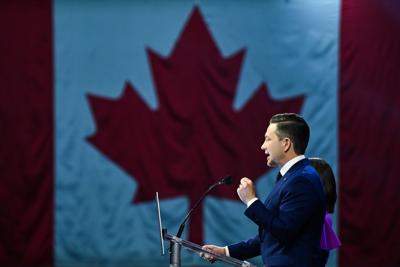OTTAWA — Let the record show that Pierre Poilievre spent the dying weeks of an election campaign he should have won the same way he has spent most of his 20-year political career: pretending to be mad about something that was never real.
Poilievre suffered a narrow but still remarkable political defeat Monday night. Ahead by 25 points in January, he finished the campaign behind Mark Carney’s Liberals in both the seat count and the popular vote.
Carney, a former central banker with zero political experience, led the Liberals to a near-certain minority government. Poilievre looked well on track, by early Tuesday morning, to lose his own Ottawa-area seat. Â
Poilievre’s inner circle will almost certainly blame U.S. President Donald Trump for the defeat. His supporters shouldn’t buy it. Trump didn’t beat the Conservatives. Carney didn’t either. Pierre Poilievre did. He had an iron grip on the Conservative base. He had an electorate motivated for change. He was facing a political amateur who ran a stumbling campaign. And still he lost.Â
There’s no real secret as to why. The Conservative leader led a painfully inflexible campaign. He focused on the wrong issues at the wrong time. He seemed blind, until it was far too late, to the impact that he, personally, was having on progressives, many of whom were sick of the Liberals, and many of whom voted Liberal anyway just to keep Poilievre out. The NDP’s share of the popular vote fell in this campaign from almost 18 per cent in 2021 down to just over six.
I wondered, watching his concession speech, whether any part of Poilievre was quietly happy that he had lost. Winning, after all, would have meant having to deal with the real world. It would have meant painful choices and unpopular bargains. Losing means he gets keep on doing what he has always done. It means he gets to stay pure. In his speech, he sounded genuinely thrilled at the idea. He has always wanted to be prime minister. Maybe he was born to oppose.
Moreso than perhaps any leader I have ever covered — and I covered Trump through two winning campaigns — Poilievre seems in love with his own version of reality. He’s like a reverse Pollyanna. He’s great at pinpointing real problems. He just can’t seem to grasp the fact that his solutions are mostly bunk, the kinds of things that would work on paper at a meeting of the campus Reform Party in 1998 but never in the real world.
I agree with Poilievre, for example, that Canada’s criminal-justice system is badly in need of reform. I just think the solutions he promised in this campaign would have mostly made things worse. They’d have bogged the system down in years of constitutional challenges, packed already-overcrowded provincial jails and done nothing to address the actual pressure points Poilievre would have found if he’d stepped off the campaign trail once in a while and spent some time in bail court in Brampton or Edmonton.
I agree with Poilievre that Canada’s housing system is a mess. I disagree that his market-only approach would have done much to bring prices down. If anything, the kinds of cuts and downloading he promised would have forced cash-strapped municipalities to hike development charges, a major driver of new home costs, even higher. (His plan would also have done nothing to address the country’s chasmic shortage of non-market housing.)
That’s why I wonder, again, if Poilievre is at all secretly happy that he lost. Winning would have meant actually testing those ideas. Losing, even narrowly, means he gets to keep fighting for them the only way he really knows how: theoretically.
This is not an exaggeration. Poilievre, after all, is the man who dedicated a closing stretch of his campaign to attacking a literally theoretical world. Instead of hammering the Liberals’ actual, flawed record, he started fixating, last week, on an obscure piece of government forecasting about potential Canadian social mobility in the year 2040. “The report paints a terrifying picture of a spiral of economic depression and cost inflation,” he said. “What they are anticipating on the current trajectory is a total meltdown, a societal breakdown in Canada if we stay on the current track.”
The report wasn’t a reflection of how things actually are in this country or even of what they are likely to be in 2040. It was instead a kind of worst-case scenario, a government-funded thought experiment writ large. It wasn’t even new. It came out in January. And yet Poilievre, days away from the election he had been preparing for his entire adult life, couldn’t let it go. He couldn’t leave the theoretical world behind to focus on the real.
It’s part of Poilievre’s lore that the first election he ever won was as president of the University of Calgary Model UN club in the late 1990s. He has always seemed more comfortable operating in a model world.
He was in government for a decade. He has been an MP for more than 20 years. His political achievements are real. He drove a level of on-the-ground enthusiasm in this campaign that I have never seen before in Canada. But he still has zero significant policy achievements to his name. Making policy is tricky, after all. It means giving people a chance to prove that you were wrong.




























To join the conversation set a first and last name in your user profile.
Sign in or register for free to join the Conversation